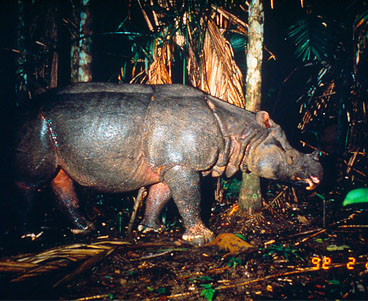Increasing alarm for the fate of the two rarest rhinoceros species, and growing concern over the increased illegal hunting of rhinos and demand for rhino horn affecting all five species, has prompted President Susilo Bambang Yudhoyono of Indonesia to declare 5 June 2012 as the start of the International Year of the Rhino.
President Yudhoyono took this step at the request of conservation organisations, because the future survival of both the Javan and Sumatran rhinos depends on effective conservation action in Indonesia.
“WWF offers its full support for the commitment made by Indonesia’s president to secure a future for the country’s critically endangered rhinos,” says Dr Efransjah, CEO of WWF-Indonesia.
“There is an urgent need to decrease pressures on habitats and to establish a second Javan rhino population in a safer and suitable location. This will be a big endeavour that will require true leadership from government and critical partnerships among scientists, conservation organizations and local communities.”
The government of Indonesia has also made commitments to establish a high-level rhino task force of national and international experts; allocate sufficient resources to enforce protection of remaining rhino populations, and ensure that there is regular and intensive monitoring of all rhino populations in Indonesia.
In the last decade, two rhino subspecies, the western black rhinoceros (Diceros bicornis longipes) in Cameroon and the Indochinese Javan rhinoceros (Rhinoceros sondaicus annamiticus) in Vietnam have gone extinct.
Today, the populations of two more subspecies, the northern white rhino (Ceratotherium simum cottoni) and the mainland population of the Sumatran rhinoceros (Dicerorhinus sumatrensis lasiotus), both listed as critically endangered on the IUCN Red List of Threatened Species, are perilously close to extinction because of an increase in illegal hunting and non-traditional use of rhino horn.
During this International Year of the Rhino, it is hoped that all rhino range states in Africa and Asia will join Indonesia and give priority to securing their rhino populations.
There are ambitions to bring illegal hunting and trade, especially the illegal trade of rhino horn, under control by ensuring that effective deterrents are in place and enforced. It is also hoped that measures that encourage a rapid growth in rhino numbers will be taken. In Indonesia, extra action will be taken to translocate isolated individuals to actively managed protected areas and improve rhino habitats by removing invasive plant species and providing additional sources of water.
“Strong and clear political messages from the highest possible levels are required to combat the illegal killing and trade in rhino and the message coming from the president is loud and clear,” said John E. Scanlon, Secretary-General of CITES.
“We hope that this bold initiative by Indonesia will serve as a catalyst for further high-level political support and commitments to protect the rhino in the wild across all concerned states”
Effective conservation by governments in Africa and Asia, in some cases with the support of WWF, has been successful in bringing back the southern white rhinoceros (Ceratotherium simum simum), black rhinoceros (Diceros bicornis) and Indian rhinoceros (Rhinoceros unicornis) from the brink of extinction.
It is clear that highly-focused management and improved conservation measures can lead to increases in the populations of rhinos, and it is now urgent that this is also implemented for the Javan and Sumatran rhinos, as the Indonesian president has stated.














